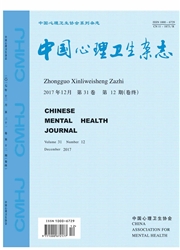

 中文摘要:
中文摘要:
目的:建立一套情绪障碍研究用汉语情绪词分类系统,为异常情绪的研究提供标准化刺激材料。方法:54名不同受教育程度的被试对344个双字汉语情绪词(包括115个正性词、114个负性词、115个中性词)的愉悦度、唤醒度和熟悉度三个维度进行9级的情绪等级评定。结果:三类词语在三个维度上的ANOVA结果显示,分别存在愉悦度主效应(F=2514.96,P=0.000)、唤醒度主效应(F=147.43,P=0.000)和熟悉度主效应(F=106.81,P=0.000)。两两比较后发现正性词的愉悦度得分(7.29±0.41)高于负性和中性词(2.81±0.30、5.47±0.66),中性词得分高于负性词;正性词的唤醒度得分(6.57±0.39)高于负性词和中性词(5.33±0.41、5.23±0.67);正性词的熟悉度得分(5.98±0.57)高于负性和中性词(4.63±0.53、5.21±0.93),中性词得分高于负性词。结论:初步建立的情绪障碍研究用汉语情绪词分类系统较好,为以后的异常情绪的研究提供词语刺激材料。
 英文摘要:
英文摘要:
Objective: To establish the Chinese effective words categorize system used in research of emotional disorder, and offer standard material for study of abnormal emotion. Methods: Fifty-four subjects in different levels of education were collected to rate the valence, arousal and familiarity by self-report in a 9-point rating scale for 344 Chinese two-character effective words. Results: According to analysis of variance there were main effects in the valence ( F = 2514. 96, P = 0. 000), arousal ( F = 147.43, P = 0. 000 ) and familiarity ( F = 106. 81, P = 0. 000 ) respectively. The average valence score of positive words ( 7. 29 ± 0. 41 ) was higher than that of negative words and neutral words, and the average valence score of neutral words (5.47 ±0. 66} was higher than that of negative words (2. 81 ±0. 30) ; the average arousal score of positive words (6. 57 ± 0. 39 ) was higher than that of negative words ( 5. 33 ± 0. 41 ) and neutral words (5.23 ± 0. 67 ) ; the average familiarity score of positive words ( 5.98 ± 0. 57) was higher than that of negative words and neutral words, and the average familiarity score of neutral words (5.21 ± 0. 93 ) was higher than that of negative words (4. 63 ± 0. 53 ) . Conclusion: The Chinese affective words system used in research of emotional disorder is established well, and provides material of word for further study of abnormal emotion.
 同期刊论文项目
同期刊论文项目
 同项目期刊论文
同项目期刊论文
 期刊信息
期刊信息
